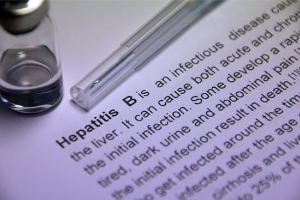
DEFINITION:
Hepatitis B is a viral infection that infects the liver
SYMPTOMS:
Symptoms may be absent at first but will eventually appear. When present, symptoms include:
- Nausea
- Vomiting
- Abdominal pain
- Joint pain
- Yellow eyes and skin (jaundice)
- Decreased appetite
- Lethargy
CAUSES:
A virus, Hepatitis B virus (HBV)
CONTAGION:
This virus is contagious. A newborn infant can catch it from an infected mother during birth. It is also acquired by exposure to infected people through sexual contact, exposure to blood or body fluids, or sharing of needles in people who use intravenous drugs. The incubation period for this virus is two to five months.
DIAGNOSIS:
Jaundice is usually the first sign of a hepatitis infection. Sometimes a rash or joint pain may accompany this. A blood test can confirm the diagnosis.
TREATMENT:
This is a virus, and therefore, there is no cure. Once this illness is diagnosed, the therapy is supportive. Fluids for dehydration, medicines to keep removing toxic substances that the liver cannot manage anymore, blood transfusions for blood loss, and pain medications are the only ways to help alleviate the symptoms.
OUTCOME:
Poor outcome. Over decades it can lead to cirrhosis of the liver, cancer of the liver, liver failure, and eventually death.
DISCUSSION:
Hepatitis B is a devastating illness. There is no cure, and therapy is minimal. The illness can go on for years before any symptoms develop. Although there may not be any obvious symptoms, the virus continues to be transmitted. Every year, 10,000 people are hospitalized in the United States with Hepatitis B, and 400 people die yearly. Hepatitis B is the second-most common cause of cancer after cigarette smoking. Once exposed, the incubation period is two to five months. Symptoms will develop at some point after that, but it can be decades. The only way to combat this illness is through prevention. Prevention is through vaccination. The Hepatitis B vaccine has been given successfully since 1990. Side effects are extremely rare and usually mild.
Before 1990, the vaccine was produced by taking the blood products of infected individuals and purifying the product so that only the immunity to Hepatitis B would be transmitted. Because of our society’s fear of using blood products, a completely new and totally safe vaccine was genetically engineered using no blood products at all. When this happened, the recommendations for Hepatitis B vaccination expanded. Before the genetically engineered vaccine became available, the vaccine was recommended only for high-risk individuals, including:
- Intravenous drug users
- Promiscuous individuals
- Healthcare workers
- Those exposed to known carriers
This recommendation failed, and many new cases of Hepatitis B developed. Once the new vaccine was created, the recommendation changed to include the following:
- All newborns
- All children
- All adolescents
- All adults
Now the incidence of Hepatitis B is finally decreasing.
Unfortunately, about 20,000 women a year in the United States are infected with Hepatitis B before giving birth to their babies. If untreated, 90% of these exposed infants will contract the illness. By using the vaccine, transmission to the infant can be stopped. Also, about 40-50% of people who contract Hepatitis B have no idea where they got it. So universal vaccination is the only way to stop this illness.
The vaccine can be given according to a wide range of acceptable schedules. The first vaccine can be given from birth to two months of age, the second from one month to six months, and the third from six months to eighteen months. There must be at least one month between the first and second injections, two months between the second and third injections, and four months between the first and third injections. For infants born to a Hepatitis B-positive mother or for people exposed to a carrier, Hepatitis B immunoglobulin can give temporary immunity. The vaccine can then be given to afford permanent immunity. The schedule for exposed people is zero, one, and six months for the three vaccine doses.
ONE DOCTOR’S OPINION:
Vaccination is so important to combat this illness. People may ask why we vaccinate babies if the mother is negative. The answer is three-fold. First, blood tests are not 100% accurate, so why take the chance? Second, many babies get the illness from an unknown carrier since not everyone with the illness has symptoms. Third, the vaccine has been proven in all well-controlled studies to be safe and effective. If anyone doubts the importance of this vaccine, find a child with this illness, and your mind will be changed forever. There is no good reason to withhold this important vaccination. Vaccinate for Hepatitis B immediately.
This blog was written by Dr. Michael Bornstein, who has 30 years of experience as a pediatrician.
Disclaimer: The contents of this article, including text and images, are for informational purposes only and do not constitute a medical service. Always seek the advice of a physician or other qualified health professional for medical advice, diagnosis, and treatment.
You can find more information regarding Hepatitis B on the CDC website.


FOLLOW US